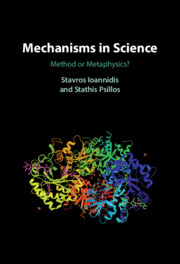4 results
Chapter 10 - Methodological Mechanism
- from Part III - Beyond New Mechanism
-
- Book:
- Mechanisms in Science
- Published online:
- 09 June 2022
- Print publication:
- 23 June 2022, pp 225-246
-
- Chapter
- Export citation
Chapter 1 - Mechanisms, Then and Now
- from Part I - Ideas of Mechanism
-
- Book:
- Mechanisms in Science
- Published online:
- 09 June 2022
- Print publication:
- 23 June 2022, pp 15-39
-
- Chapter
- Export citation
Introduction
-
- Book:
- Mechanisms in Science
- Published online:
- 09 June 2022
- Print publication:
- 23 June 2022, pp 1-12
-
- Chapter
- Export citation

Mechanisms in Science
- Method or Metaphysics?
-
- Published online:
- 09 June 2022
- Print publication:
- 23 June 2022

